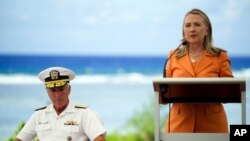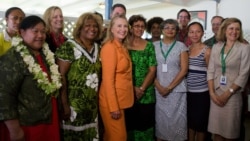“When we talk about our engagement in the Asia Pacific, we really are looking at a model of partnerships that reflects our shared values, delivers practical benefits, and helps create stronger economies and societies, ”U.S. Secretary of State Hillary Rodham Clinton said recently when commemorating U.S. Peace and Security Partnerships in the Pacific at Rarotonga, Cook Islands. “Our goal is to help the island nations of the Pacific realize their own aspirations.”
The United States works closely with its Pacific partners on a range of transnational and maritime security issues including crime, trafficking in persons, nuclear nonproliferation, and disaster response and preparedness. Secretary Clinton specifically highlighted the United States’ “work to reduce the number of unexploded bombs, shells, and other ordnance left over from World War II that unfortunately still litters the lands and waters of the region.” Decaying ordnance leaks chemicals that pollute the water and soil. That makes it harder for people to develop their land, promote tourism, and spark economic growth.
The United States Government has already committed more than $2 million to help identify, remove, and destroy unexploded ordnance throughout the Pacific islands. Secretary Clinton announced an additional $3.5 million to further these efforts.
“Seventy years ago our countries stood together to fight for security and peace in the Pacific,” said Secretary Clinton in conclusion. “At the end of that terrible world war . . . The United States did not leave the Pacific . . . we focused on making sure that the region continued to be safe and secure . . . We’re going to work together to ensure that all the people of the Pacific islands, in the 21st century, have the chance to fulfill their own God-given potential.”
The United States works closely with its Pacific partners on a range of transnational and maritime security issues including crime, trafficking in persons, nuclear nonproliferation, and disaster response and preparedness. Secretary Clinton specifically highlighted the United States’ “work to reduce the number of unexploded bombs, shells, and other ordnance left over from World War II that unfortunately still litters the lands and waters of the region.” Decaying ordnance leaks chemicals that pollute the water and soil. That makes it harder for people to develop their land, promote tourism, and spark economic growth.
The United States Government has already committed more than $2 million to help identify, remove, and destroy unexploded ordnance throughout the Pacific islands. Secretary Clinton announced an additional $3.5 million to further these efforts.
“Seventy years ago our countries stood together to fight for security and peace in the Pacific,” said Secretary Clinton in conclusion. “At the end of that terrible world war . . . The United States did not leave the Pacific . . . we focused on making sure that the region continued to be safe and secure . . . We’re going to work together to ensure that all the people of the Pacific islands, in the 21st century, have the chance to fulfill their own God-given potential.”






